Overview
Creating an accurate cost quotation can feel a bit daunting, right? But don't worry! There are six essential steps that can make this process clearer and more effective. First off, let’s talk about the importance of clarity and detail in your quotes. It’s not just about numbers; it’s about building trust with your clients.
So, what are these key components? Well, start with gathering all the necessary company and client information. This sets the stage for transparency in pricing, which is crucial. Additionally, effective communication plays a huge role in ensuring everyone is on the same page. When clients feel informed, they’re more likely to engage positively.
Now, think about how these elements contribute to successful business transactions. By focusing on clarity and detail, you’re not just providing a quote; you’re building a relationship. And remember, this isn’t just a one-time effort. It’s about creating a dialogue that encourages trust and collaboration.
Are you ready to dive deeper into these steps? Let’s explore how you can implement them effectively and watch your business thrive!
Introduction
Creating an accurate cost quotation isn’t just another business task; it’s a key factor that can shape the success of your relationships with clients and the outcomes of your projects. Think about it: when you focus on being precise and clear, you not only boost your professionalism but also build trust and transparency with your clients. But with so many details to consider and potential hiccups to avoid, how can you make sure your cost quotations really stand out in today’s competitive landscape? In this article, we’ll explore some essential steps to help you craft detailed and effective cost quotations that can enhance your company’s reputation and drive operational success.
Understand the Importance of Cost Quotations
Cost quotations are essential in manufacturing and distribution, providing potential clients with a clear picture of pricing and services. Think about it: a not only shows professionalism but also builds trust with clients. It acts like a vital decision-making tool. Clients can easily compare options and make informed choices based on clear, precise information. Plus, a well-designed estimate helps avoid misunderstandings and conflicts during transactions, which leads to stronger customer relationships and better sales efficiency.
Businesses that focus on precision in their estimates often see happier customers and increased loyalty. When clients feel confident in their buying choices, that trust becomes essential, especially in B2B sales, where long-term partnerships thrive on reliability and transparency. By ensuring that citations are detailed and accurate, manufacturers can really boost their reputation and operational success.
Accurate cost quotations are essential for successful procurement. As industry expert Buck Foley puts it, 'A detailed cost quotation serves as a roadmap for your product development process and assists in creating realistic financial projections.' Additionally, including detailed specifications and clear requirements in the quoting process can further enhance accuracy. This aligns perfectly with GenAlpha's mission to empower businesses through innovative digital solutions. So, how are you ensuring your estimates stand out?
Identify Key Components of a Cost Quotation
Creating a solid cost quotation is essential to avoiding confusion and ensuring everyone’s on the same page. So, what should you include? Let’s break it down:
- Company Information: Start with your business name, address, and contact details. This sets a trustworthy tone right off the bat.
- Client Information: Don’t forget to add your client’s name, address, and contact details. Personalizing the estimate can make a big difference.
- Quote Date: Make sure to specify when the quote is issued. This provides a handy reference point.
- Description of Goods/Services: Give a detailed rundown of the goods or services you’re quoting. Include specifications and any relevant features to paint a clear picture.
- Pricing: Lay out clear pricing for each item or service, and remember to include any applicable taxes or fees. Transparency is crucial.
- Terms and Conditions: Outline payment terms, delivery timelines, and any warranties or guarantees. This sets clear expectations and helps avoid surprises.
- Validity Period: Indicate how long the estimate is valid. This helps clients make timely decisions.
Incorporating these elements not only boosts the professionalism of your estimate but also aligns with industry best practices. For instance, companies like Cougar Companies have experienced revenue growth—up to five times—after implementing organized estimating software that emphasizes comprehensive estimates. This demonstrates the real benefits of thorough , which can enhance client relationships and improve sales efficiency.
Additionally, it’s crucial to review project documentation to ensure thoroughness regarding scope, technical specifications, and commercial conditions before finalizing your estimate. Holding a kick-off meeting with relevant team members can also help confirm details and gather feedback, ensuring everything is considered in the cost quotation process. And let’s not forget to identify common challenges in cost estimation, like lacking project details, as this can significantly enhance the efficiency of your proposal.
So, are you ready to elevate your estimating game?
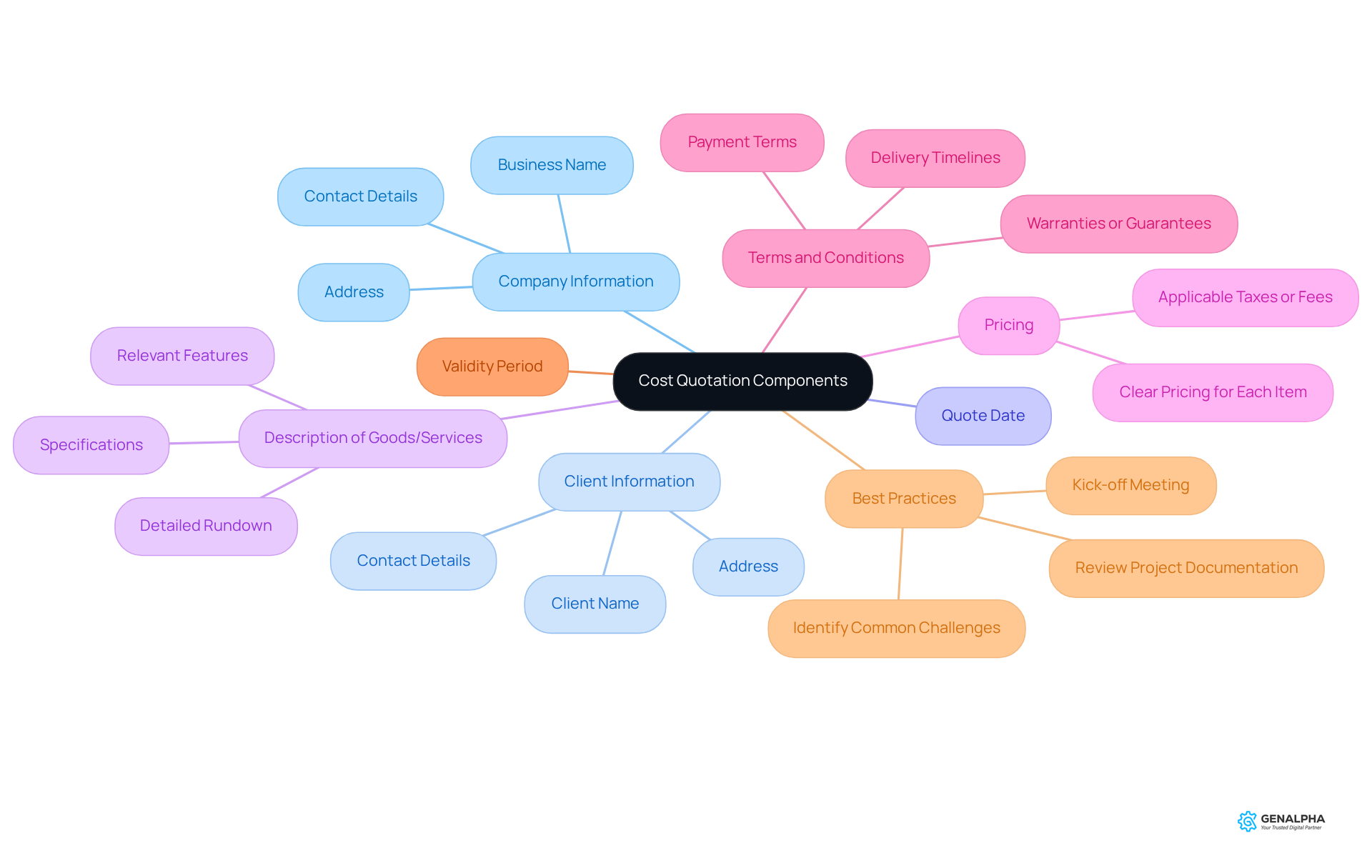
Gather Relevant Data and Pricing Information
Creating a precise can feel like a daunting task, but it doesn't have to be! Start by gathering all the relevant data and cost details. Have you taken a good look at your inventory and existing cost structures? Tools like ERP systems or inventory management software can be a game changer here, giving you quick access to current costs and stock levels.
Additionally, don't forget to consider market trends and what your competitors are charging. This step is crucial to ensure your estimate stays competitive. If it makes sense, reach out to your suppliers to see if they can offer you bulk pricing or discounts.
As you collect all this information, be sure to record everything carefully. This attention to detail will help ensure precision in your estimate. Ready to dive in and start gathering your data? Let's make that estimate as accurate as possible!
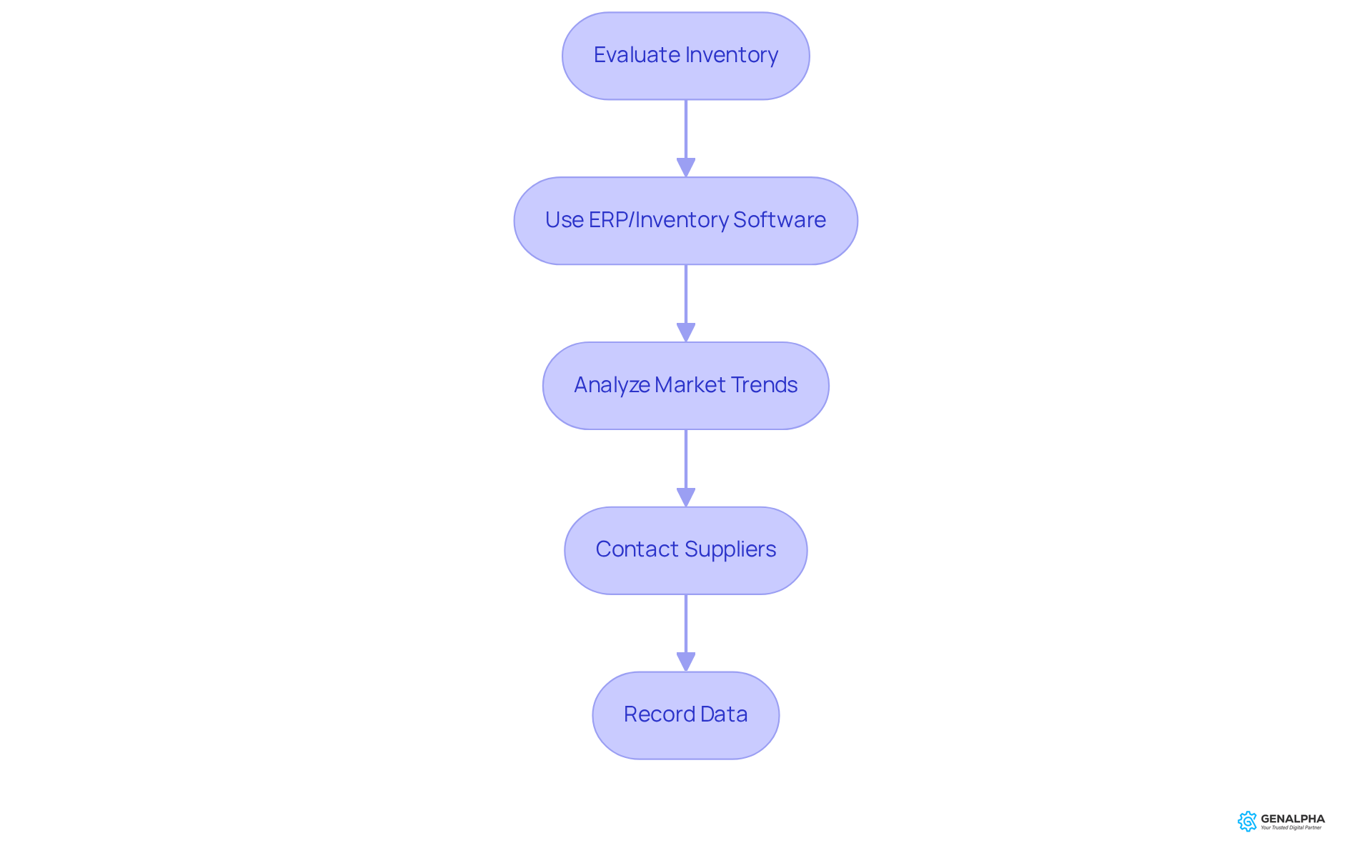
Create the Quotation Document
Once you've gathered all the essential details, it's time to whip up that quotation document! Start with a professional template that truly reflects your brand identity. You’ll want to kick things off with your company logo and contact information right at the top. Then, add your customer's details along with the date.
Keep the content organized and clear—use headings and bullet points to make it easy to read. Don't forget to include all the key components we discussed earlier, making sure the cost quotation is laid out clearly. Finally, save the document in a widely accepted format like PDF to keep everything looking sharp when you send it off to your clients. Ready to get started?
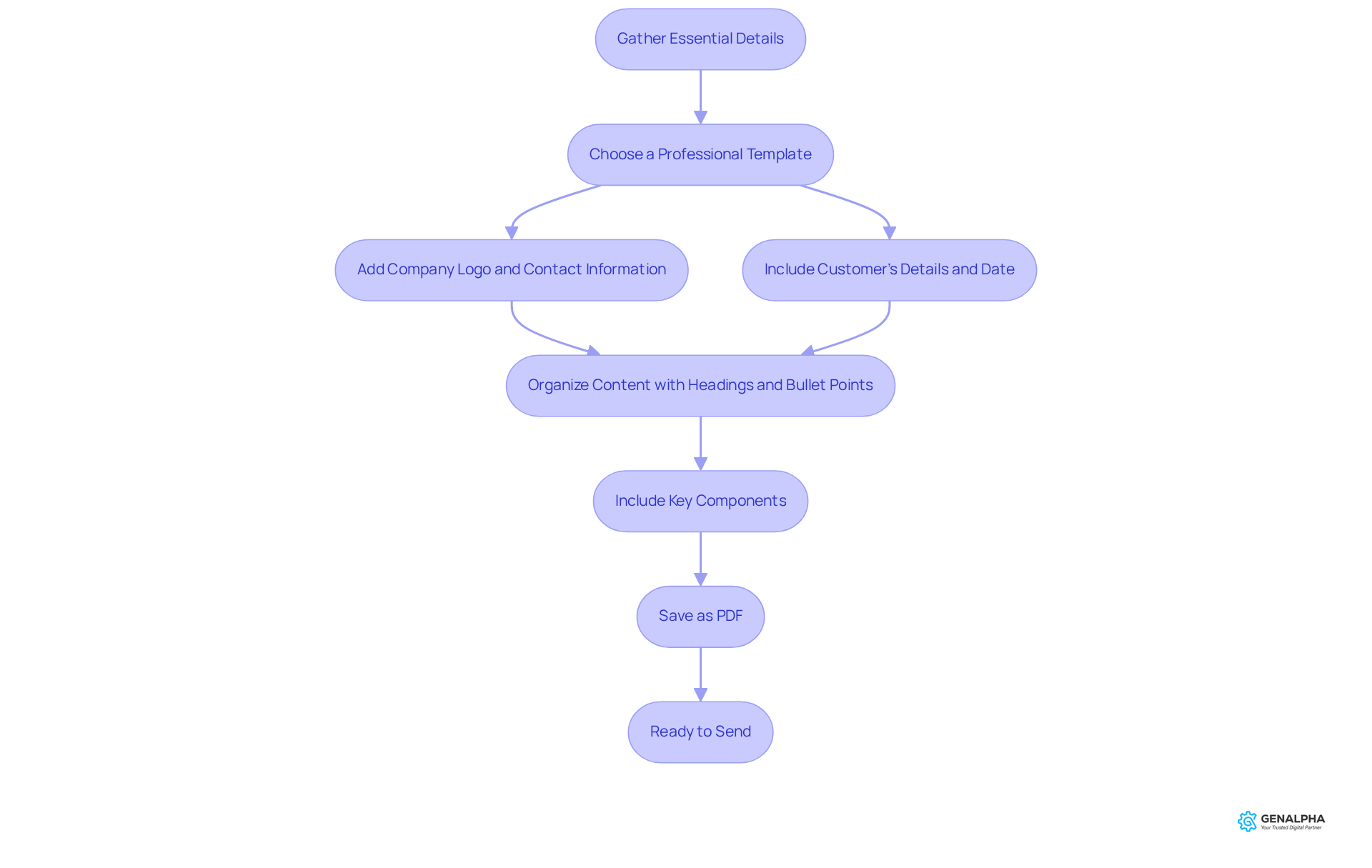
Review and Revise the Quotation for Accuracy
Before you send out that quotation, take a moment to really review and polish it up. Are there any typos? What about incorrect costs or missing info? Sometimes, having a colleague take a look can be super helpful—fresh eyes can spot mistakes you might have missed. Make sure all your terms and conditions are crystal clear and that the document looks good. This step is key to in your business dealings.
As Indra Nooyi wisely points out, "Transparency in costs demonstrates respect for your customers," and that’s essential for building trust. Plus, studies show that transparent pricing fosters customer trust and loyalty, highlighting just how important it is to be precise with your estimates. Common pitfalls in cost quotations often include vague terms and miscalculations, but these can be easily avoided with careful proofreading and adherence to best practices.
For those of you in the equipment production game, using these strategies not only sharpens your documentation but also helps you build stronger connections with your customers. Companies that focus on detailed price evaluations often see a big boost in their reputation and customer trust. So, why not give it a shot? Your business will thank you!
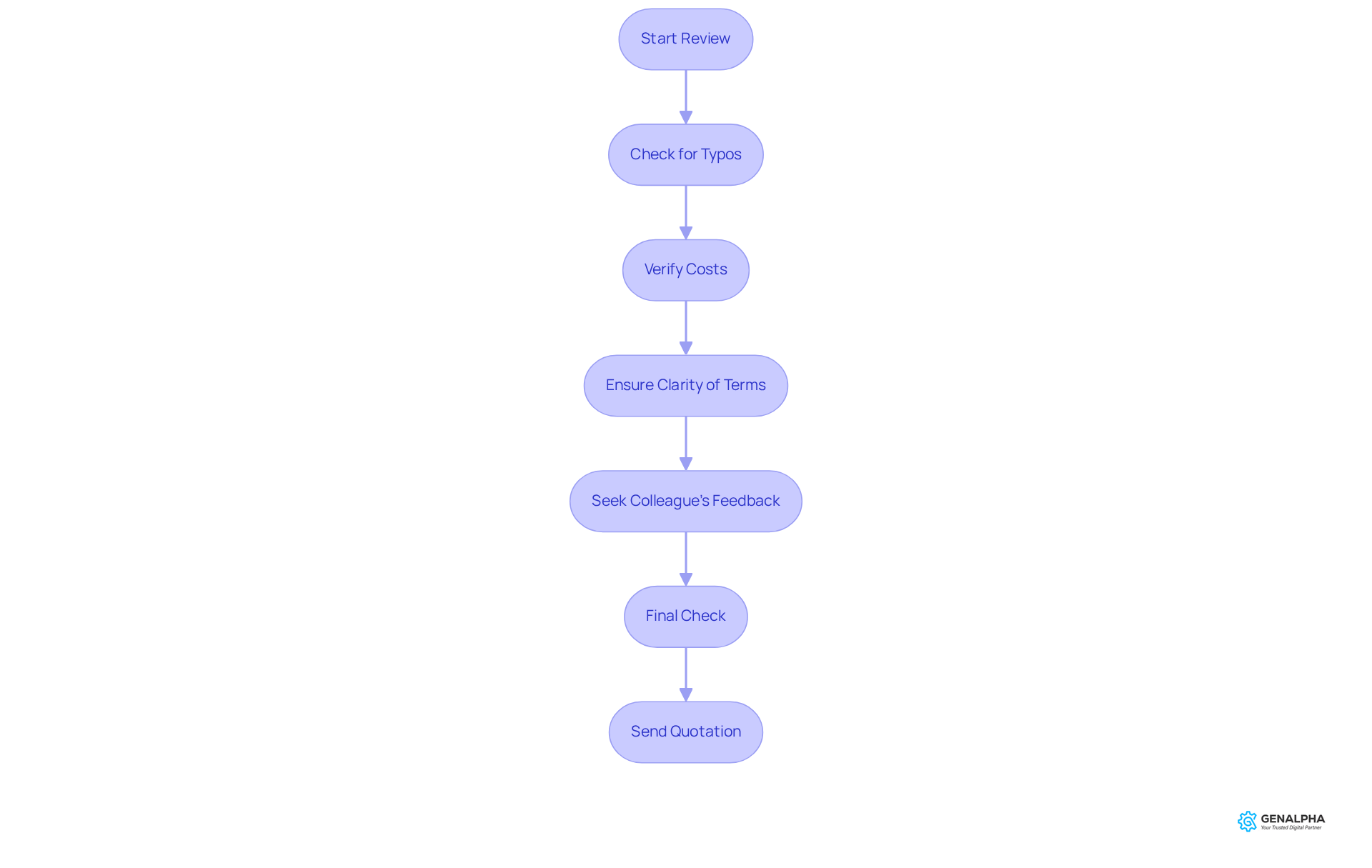
Communicate the Quotation Effectively
Once you’ve got that estimate confirmed, it’s super important to share it clearly with your customer. Think about how you want to deliver it—maybe through email, an in-person chat, or a digital platform. When you present the estimate, like pricing, terms, and what makes your offer stand out. And don’t forget to be ready for any questions the customer might throw your way; offering extra details can really help.
Following up after you send the proposal is key! It not only checks if they received it but also gives you a chance to address any concerns they might have. Did you know that research shows timely follow-up can boost your sales closure rates by up to 30%? That really shows how crucial it is in the quoting process. Plus, these days, clients expect quotes back within 24 hours. It’s a good idea to set a 'valid until' date—typically around 30 days from when you send the quote—to manage expectations effectively. What do you think? Are you ready to make your quoting process even smoother?
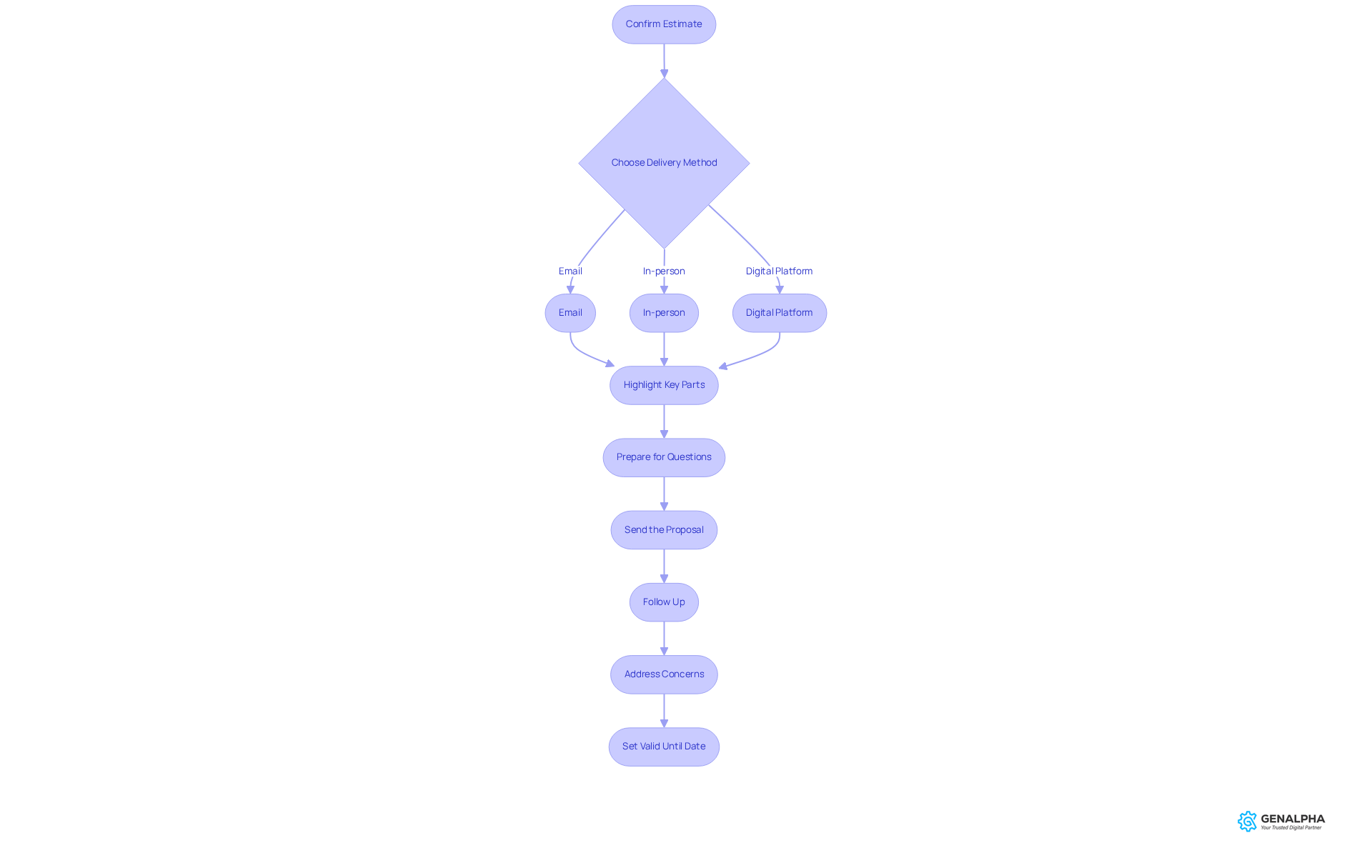
Conclusion
Crafting an accurate cost quotation is a vital skill for businesses that want to build trust and professionalism with their clients. By recognizing the importance of precise estimates, you can enhance your reputation and operational success. A well-structured quotation doesn’t just clarify pricing and services; it serves as a foundation for informed client decision-making, ultimately leading to stronger partnerships and improved sales efficiency.
Throughout this guide, we’ve outlined key components of an effective cost quotation. This includes:
- The necessity of detailed company and client information
- Clear pricing structures
- Well-defined terms and conditions
By emphasizing thorough data gathering and meticulous review, you can avoid common pitfalls and maintain your credibility. The steps to create, communicate, and follow up on quotations are designed to streamline the process and maximize client satisfaction.
In today’s competitive marketplace, the ability to deliver accurate and transparent cost quotations can significantly impact your business success. By implementing these best practices, you’ll not only enhance your quoting processes but also build lasting relationships with clients based on trust and reliability. So, why not embrace these strategies to elevate your business's quoting game? Ensure that every estimate stands out and meets the needs of your customers effectively.
Frequently Asked Questions
Why are cost quotations important in manufacturing and distribution?
Cost quotations provide potential clients with a clear picture of pricing and services, showcasing professionalism and building trust. They serve as a vital decision-making tool, allowing clients to compare options and make informed choices, while also helping to avoid misunderstandings during transactions.
What impact do accurate cost quotations have on customer relationships?
Accurate cost quotations lead to happier customers and increased loyalty. When clients feel confident in their buying choices, it fosters trust, which is essential for long-term partnerships, especially in B2B sales where reliability and transparency are crucial.
What are the key components that should be included in a cost quotation?
A solid cost quotation should include the following components:
- Company Information: Business name, address, and contact details.
- Client Information: Client’s name, address, and contact details.
- Quote Date: The date the quote is issued.
- Description of Goods/Services: Detailed rundown of the goods or services being quoted.
- Pricing: Clear pricing for each item or service, including taxes or fees.
- Terms and Conditions: Payment terms, delivery timelines, and warranties or guarantees.
- Validity Period: How long the estimate is valid.
How can businesses enhance the accuracy of their cost quotations?
Businesses can enhance accuracy by including detailed specifications and clear requirements in the quoting process. Reviewing project documentation and holding a kick-off meeting with relevant team members can also help confirm details and gather feedback.
What are some common challenges in cost estimation?
Common challenges in cost estimation include lacking project details, which can significantly hinder the efficiency of the proposal process. Identifying these challenges early can help improve the overall effectiveness of cost quotations.
How can organized estimating software benefit companies?
Implementing organized estimating software can lead to significant revenue growth and enhance client relationships by emphasizing comprehensive estimates, thus improving sales efficiency.




